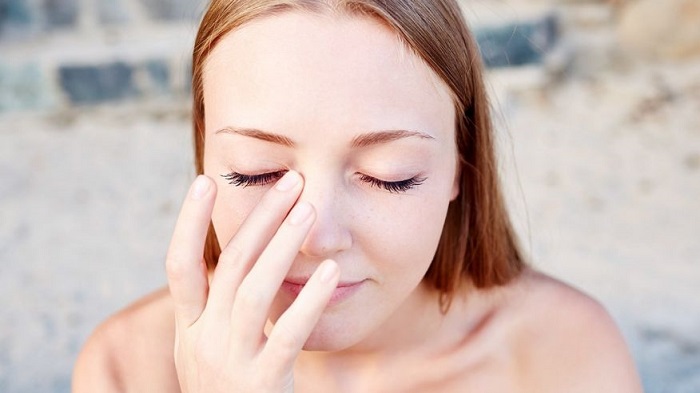8 reasons your eyes are itchy

Here are eight of the most common causes of itchy eyes and what you can do about them.
1. Food, animal, or environmental allergiesn
“Itchy eyes is usually the hallmark symptom of eye allergies,” Geoffrey Goodfellow, O.D., co-chair of the American Optometric Association’s communications and marketing group executive committee and assistant dean at the Illinois College of Optometry, tells SELF. This is also called allergic conjunctivis. “Allergic conjunctivitis is basically a mini allergic reaction to some allergen—it could be food or environmental, seasonal allergens—in the eye,” Neeta Ogden, M.D., board-certified allergist, tells SELF. “People can also get itchy eyes from just being exposed to a cat or dog,” she adds. Touching an allergen—whether it be a food, plant, or animal—and then touching your eye will likely make it itchy. There will usually be a clear pattern with an allergy. “If itchy eyes are happening daily, it’s the middle of an allergy season, and this happens year-after-year, or if you only get itchy eyes around one clear trigger—a dog or cat, for example—you know it’s an allergic reaction,” Ogden says. Taking over-the-counter antihistamines like Zyrtec or Claritin, or using allergy eye drops, can help calm the allergic response and ease itching.
2. Dry eye
“Dry eye, a condition in which a person doesn`t have enough quality tears to lubricate and nourish the eye, is a common and often chronic problem, particularly in older adults,” Goodfellow says. As opposed to some of the other causes of itchy eyes, dry eye is a chronic condition and needs to be treated. “Chronic dry eye causes burning, itching or stinging eyes, intermittent blurring of vision, and—paradoxically—watery eyes,” Jacquot explains. Using artificial tears and avoiding redness-reducing eye drops can help keep eyes lubricated and relieve the itch.
3. Pink eye
If eye itchiness is paired with a pink or red color, discharge coming from the eye, or any of the other classic pink eye symptoms, see an eye doctor. You may need a dose of antibiotics, depending on what’s causing the pink eye. In the meantime, don’t touch your eye—pink eye is super contagious, and you can easily spread it to your other eye or another person.
4. Irritating products
Some chemicals or ingredients in personal care products can lead to contact dermatitis, an irritating and itchy rash on the skin. “This is a delayed allergic reaction to an allergen and is commonly seen with makeup or jewelry and it can lead to read flakey skin especially around the eye lid,” Ogden says. Dermatitis of the eyes can be caused by other irritants, but makeup and skincare are the most common culprits. “Transitioning to hypoallergenic cosmetics, especially for products that go right around the eyes, can be a good way to address itch,” Jacquot suggests.
5. Eyelid inflammation
The medical term is blepharitis, and the most common causes are staph bacteria on the skin, scalp dandruff, and skin conditions like rosacea. Blepharitis causes the eyeballs themselves to become itchy, red, teary, swollen, dry, and crusty, Jacquot says. “Often, dandruff-like scales form where the eyelid meets the eyelashes. In more severe cases, it can cause blurred vision, inflammation of the eye tissue (especially the cornea), or missing eyelashes.”
6. Digital eye strain
“Thanks to our increasingly digital lifestyles, people are much more susceptible to digital eye strain than they once were,” Jacquot says. “All this screen time can stress out the eyes and cause them to feel itchy.” Digital eye strain can also cause fatigue, headaches, difficulty focusing, and potentially impact your vision long-term. To manage eye strain, use the trusty 20-20-20 rule: Look at something about 20 feet away for 20 seconds every 20 minutes of digital device use.
7. Something in your eye
Whether a piece of sand from a day at the beach, or a speck of dust that makes its way into your eye, having a foreign object in your eye can cause itchiness, irritation, and pain. But you really don`t want to scratch if you can help it. “Scratching at a foreign object can result in corneal abrasion, which increases the risk of infection and can lead to corneal scarring,” Jacquot warns. If you think there’s something in your eye, try flushing it out with water or artificial tears (which are just eye drops without any extra chemicals or purpose beyond lubricating your eyeballs). If it still itches or hurts, it`s possible the object just left irritation or a small scratch in its wake. If you really can`t get something out of your eye, call your eye doctor or go to a local eye clinic or the ER.
8. Contact lens use
If you wear contact lenses daily, you may experience itchy eyes for a few reasons. Long-term contact use can increase your risk of developing dry eye, Teri Geist, O.D., co-chair of AOA’s communications and marketing group executive committee and an optometrist at Midwest Eye Care in Omaha, Nebraska, tells SELF. Allergens can also collect in the lenses and make allergy symptoms worse, she adds. Some people can also develop a contact lens allergy called giant papillary conjunctivitis or contact lens-induced papillary conjunctivitis, Jacquot says. “This allergy makes the eyes sensitive, red, and itchy. GPC occurs when the contact lenses continuously rubs against the conjunctiva (the mucous membrane that lines the front of the eye and inside of the eyelids),” he explains. Risk factors include poor contact lens hygiene, family history of related allergies, and conditions such as asthma, eczema, or hay fever.















































